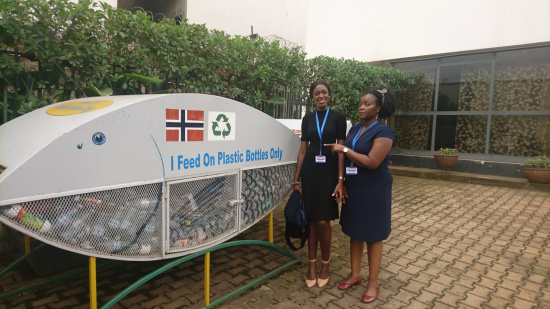DigI:Way-ahead Embassy Norway Uganda
From its-wiki.no
| Digital Inclusion (DigI) | |||||||
|---|---|---|---|---|---|---|---|
|
DigI:Way-ahead Embassy Norway Uganda
| Title | DigI:Way-ahead_Embassy_Norway_Uganda |
|---|---|
| Place | Norwegian Embassy@Kampala |
| Date, Time | 2020/02/26, 0940-1000 |
| Contact Person | Zenia Chrysostomidis |
| Participants | Anna Skiaker Aschjem, Mary Mabweijano, Zenia Chrysostomidis, Brenda Jimris-Rekve, Josef Noll, Lillian Nalwoga |
| related to Project | DigI, BasicInternet |
| Keywords |
| this page was created by Special:FormEdit/Meeting, and can be edited by Special:FormEdit/Meeting/DigI:Way-ahead Embassy Norway Uganda |
| Category:Meeting |
Purpose
The purpose of the meeting was to inform the Embassy of Norway about the activities of the Basic Internet Foundation in Uganda, including
- the meeting with the Ministry of ICT on 25Feb2020, including the presentation on National Knowledge Portal for Uganda
- the meeting with UCC, Ministry of ICT and Internet Governance Forum on 26Feb2020,
- further information on the Workshop on sustainable school connectivity 27Feb2020 and the Hackathon on building information spots on 27-28Feb2020, both at Muhimbili University of Technology in Dar es Salaam
Participants
- Zenia Chrysostomidis, Minister Counsellor,
- Mary Mabweijano, coordinator SDG 3 and SDG 4
- Anna Skiaker Aschjem, stagiaire
- Brenda Jimris-Rekve, Basic Internet Foundation
- Lilian Nalwoga, Internet Governance Forum
- Josef Noll, Basic Internet
Notes from the meeting
Given the request for further information, these are the notes from the meeting enhanced with background information.
Introduction of Basic Internet
In order to reach the targets for SDG 3 and SDG 4, digital inclusion and societal empowerment is a key area. The University of Oslo (UiO) and Kjeller Innovation have established the Basic Internet Foundation (BasicInternet.org), to foster solely on connecting the unconnected. The Foundation has established the the concept Internet Lite for All, the free access to information for everyone. furthermore, the Foundation
- has the vision to improve the life of every human through free access to information on the Internet
- promotes and provides the Freemium model for access
- builds Information spots with free access to information, and premium access to broadband services.
The Government of Norway (Research Council of Norway, Norad and MfA) supports the work of the Foundation through the Non-discriminating Access for Digital Inclusion' (DigI project), involving 11 partners from 9 countries. As part of the DigI project, the consortium has connected 10 villages in Tanzania (see DigI:Villages) and established the basis for local communities building information spots.
The provision of digital health information through publicly available information spots in remote villages has shown tremendous success.
The work of the Foundation was recognised by the United Nations' High-Level Panel on Digital Cooperation, and was cited as an example by the Norwegian Parliament Report Digital transformasjon og utviklingspolitikken (Stortinget Meld. St. 11, 2019–2020). See further details at DigI:Publications.
Ongoing work in Uganda and Tanzania
Regarding the other activities, in Uganda and the East-African Council, here are the main conclusions. Details are in the links
Meeting with the Ministry of ICT on 25Feb2020, including the presentation on National Knowledge Portal for Uganda
- a first information meeting where we presented our vision, demonstrated our solution, and got a feedback on national strategy in Uganda
- we agreed that the Ministry will involve important stakeholders and will follow-up, heading towards a pilot project for school connectivity
Meeting with UCC, Ministry of ICT and Internet Governance Forum on 26Feb2020,
- we got the support from UCC on activities for digital inclusion, focussing on collaboration with the Research and Education Network Uganda (RENU)
- we were advised to talk directly to Telecom operators for getting the sustainable connectivity model out in praxis
- we were advised to also look into other areas where digital empowerment is needed, e.g. the Uganda Strategic Health Plan for primary health services-
In Tanzania, we organised a Workshop on sustainable school connectivity on 27Feb2020. UCSAF (Universal Communication Service Access Fund) supports school connectivity and is inviting to a proof-of-concept involving 10 schools. Main conclusions were:
- OPEX costs need to be affordable for the local communities/schools. It has to be ensured that the OPEX costs can be covered locally, thus a target of max 20 USD/month is envisaged for rural areas. If there is a certain demand, then access solutions with higher costs can be considered.
- The Internet need to be centred around people and need to answer the needs of the local communities. Main goal should be to empower the society, including content hosted locally.
- Both inclusion of policy makers and policies to ease the roll-out of community networks are essential for the success of digital inclusion. Community networks find their role in areas where mobile operators don't see a viable business model.
The Hackathon on building information spots on 27-28Feb2020, comprised community members from 5 countries, and focussed on the technical understanding on establishing information spots with Internet Lite.
- Given the success of village/school/health facility connectivity through the DigI project, we created the walk through on how to establish the Information Spots.
- Knowledge transfer and collaboration between Norway and the participating countries was agreed to ensure local competence in establishing, operating and maintaining the information spots.
- Catherine presented the work by African Child in empowering women and girls, pointing out the need for training in addition to creating the information spots
- Given the success of the first 3 information spots, AHERI in Kenya asked for establishing 1.500 sites
- BOACSE has successfully connected two schools, and envisions to connect another 130 schools in the area of Mbeya in Tanzania.
Way ahead
The Embassy acknowledged the work of the Foundation, and asked for more information (this page with links). The Embassy will help in connecting to the right stakeholders and offers to host a high-level meeting.

